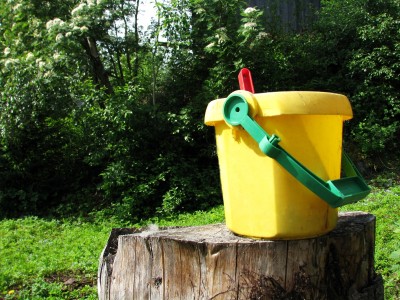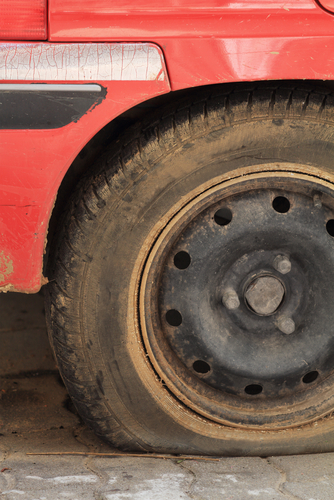Last updated on February 7th, 2013 at 04:04 pm
My dream of financial mastery has me thinking about my budget, such as it is. Working on the household budget this week, I realized that I, like most people, have three budget buckets.
The first bucket is called Things that Aren’t Going to Happen Any Time Soon.
In this bucket go the fantasies – the “what I’d do with my lottery winnings” kind of fantasies. These are things that are so far outside rational thought that even planning for them seems outlandish. Here are a couple of items I have in this bucket:
- Paying off the house (without selling it)
- Retirement for Virgo Man and myself
- Paying 100% of my children’s college expenses
- Spending half the year in the Caribbean, or Greece, or Croatia, on a yacht
The consequences of not achieving these things are more abstract than concrete. That’s partly what makes it easy to write them off as unrealistic. What’s the consequence of not paying off the house? We just keep on cranking out the mortgage payment month after month. What’s the consequence of not retiring? We keep on working. These are things we are already doing, so we’re kind of used to it. There’s no pressing need to change.
The second bucket is called Things That Have to Happen Or Else.
In this bucket go the things for which the consequences of not paying are so dire as to be unthinkable. Although technically there’s always a choice, in reality the choice isn’t practical. Here are a few things I have in this second bucket.
- Paying the mortgage
- Putting food on the table
- Keeping the aged cars that Virgo Man and I drive running and safe
- Alimony, taxes, and child support
The consequences of not paying for the things in Bucket #2 are the opposite of abstract. In fact, they are quite tangible and entirely real. Not paying the mortgage means the bank will take away the keys to the house. Not putting food on the table means we go hungry. Not keeping the old cars running means they break down and we have no transportation. It’s pretty simple. We have to pay these expenses, or we’ll risk paying a price we are unwilling and even unable to pay.
The third bucket is called Things We Need, But It’s All in the Timing.
This bucket is for things that seem pretty important to do, but that don’t have immediate dire consequences. Here are some examples from my Bucket #3.
- Music lessons for O Psychic One
- A speed reading and study skills class for Sir Empath
- Sunbrella fabric to recover our patio chairs
- Someone to haul away the old TV, and the disposal fee to get rid of it
There are consequences to not doing each of the things in Bucket #3, but they are tolerable. I can live with them if I have to. O Psychic One is musically gifted, and he’ll still be musically gifted if he doesn’t get music lessons immediately. Sir Empath doesn’t even know he needs speed reading and study skills, so he can hobble along for awhile without it. The old TV has taken up residence in the family room, and although it is screwing with the decor big time, we’re not going to die if it stays there for another month or two.
The thing is, Bucket #3 is like the home version of “miscellaneous” on a business profit and loss statement. We business coaches know that Miscellaneous is a necessary category on the P&L, because without it you’ve got a superabundance of categories that might have one or two uses, and no more, in any given year. Buying raffle tickets to support the local kids’ soccer team goes in Miscellaneous. So does the pizza brought in one time when everyone pulled an all-nighter to finish a project on deadline. These are essentially one-off expenses that have no home anywhere else on the P&L.
Bucket #3 is kind of like that. Everything in Bucket #3 needs to get done, but with vague and undefined degrees of urgency. It’s not a disaster not to do them, and it’s not cause for celebration if we do them. They’re just…there. They’re not unrealistic enough for Bucket #1, and they’re not crucial enough for Bucket #2. So by default, they end up in Bucket #3.
The problem with Bucket #3 is much the same as the problem with Miscellaneous. It’s easy for bloat and laziness to set in on them. Instead of thinking and planning, there’s a tendency to just dump stuff straight into Bucket #3 and let it sit there gathering dust forever. Collect enough of those, and Bucket #3 has no value at all. It might as well be Bucket #1 – Things that Aren’t Going to Happen Any Time Soon.
But do you really want disposing of the old TV to be one of those Things That Aren’t Going to Happen Any Time Soon?
Nah. It kind of has a chilling effect on the glamour, the enigmatic unreachability, and the romance of Bucket #1 if it’s got an old tv stuck in there.
So here’s my thought. Bucket #3 needs regular attention. Anything in Bucket #3 that has been in there for more than three months probably does not qualify for Bucket #3 status, because clearly the consequence of not taking care of it hasn’t materialized. And if there’s no consequence, then why deal with it? Life is too short. Don’t just let it sit there, unloved and unattended. Don’t treat it like the poor step-child of Bucket #1. Either fix it, or forget it.
It’s a form of Getting Things Done for the budget. Deal immediately with what’s critical. Set aside what’s never going to happen. Focus your attention on whatever’s in between.
What do you think, Dreamers? What’s in your Budget Buckets?

Enjoy this special 8WomenDream Guest Contributor story submitted by new and experienced big dreamers throughout the world, edited and published to capture a dream perspective from different points of view. Do you have a personal dream story to share with 8WomenDream readers? Click here to learn how to submit dream big articles for consideration.
Note: Articles by Guest Post Contributors may contain affiliate links and may be compensated if you make a purchase after clicking on an affiliate link.





